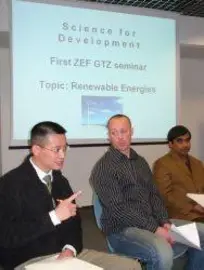"Science for Development" - first ZEF-GTZ seminar held
March 12, 2009.
Cooperation between science and extension organisations such as the German Technical Cooperation (GTZ) is a win-win situation. This is one of the conclusions of the first ZEF-GTZ-seminar on „Science for Development“, which was held on February 12 at the GTZ headquarters in Eschborn. This seminar was the first of a series of exchange rounds titled “Science for Development” and featured on the topic of renewable energies.
Around 30 scientists and experts of ZEF and GTZ attended the seminar to discuss the possibilities of a closer cooperation in the area of renewable energies. The sectoral project on Higher Education supports the Bonn Interdisciplinary Graduate School for Development Research (BiGS-DR) of ZEF since 1999 financially with funds made available by The Federal Ministry of Economic Cooperation and Development (BMZ). More than 110 ZEF doctoral research projects have been supported by these funds so far.
Three ZEF junior researchers, Alam Mondal, Tyler Frazier and Chian-Woei Shyu presented their research during this first seminar. Alam Mondal’s PhD research is on the potential of renewable energies in Bangladesh. Solar energy has a high potential in this country with more than 300 sun-days per year. His research shows that up to 35% of the total energy consumption in Bangladesh could be covered by renewable energy till the year 2035, compared to 1% currently.
Tyler Frazier does research on the energy consumption of suburban areas in Accra, Ghana. He uses a complex simulation model based on a geographic information system to forecast energy demand for the coming 30 years. He collaborates with several institutions, ministries and organisations in Ghana to develop an energy use plan for this suburbia.
Which socio-economic impact has the use of renewable energies in remote rural areas of Western China? Chian-Woei Shyu presented a case study on a remote village in the western Chinese province Qinghai. Within the ‘Township Electrification Program’, the Government of People’s Republic of China had constructed a photovoltaic plant in the village. The studies showed that the success of the program is not dependent on technical solutions. In fact, financial, management, skilled personnel and institutional aspects are much more important.
The discussion after the presentations underlined the challenges for the use of renewable energies. Often, not only technical solutions are required, and a mix of different energy sources has to be adapted to the geographic, socio-economic and political conditions. The synergies of research and extension services were also discussed. For instance, simulation models and cost-benefit analyses like those developed by the ZEF doctoral students are of considerable advantage for GTZ to convince local decision makers. Also attendant research is often required for the implementation of new technologies. On the other side, a closer collaboration of research and extension organisations may help to transfer useful research results: Which strategies contribute to the successful implementation of renewable energy research programs? What impact do the different technologies have on poverty reduction and gender equity? These and many more questions can be jointly tackled within a future collaboration between ZEF and the GTZ.
The next ZEF-GTZ will presumably take place in May 2009.
The doctoral studies of Alam Mondal, Chian-Woei Shyu and Tyler Frazier are financed by BMZ via DAAD/GTZ, Friedrich Ebert Foundation (FES)/GTZ and BMBF, respectively.


